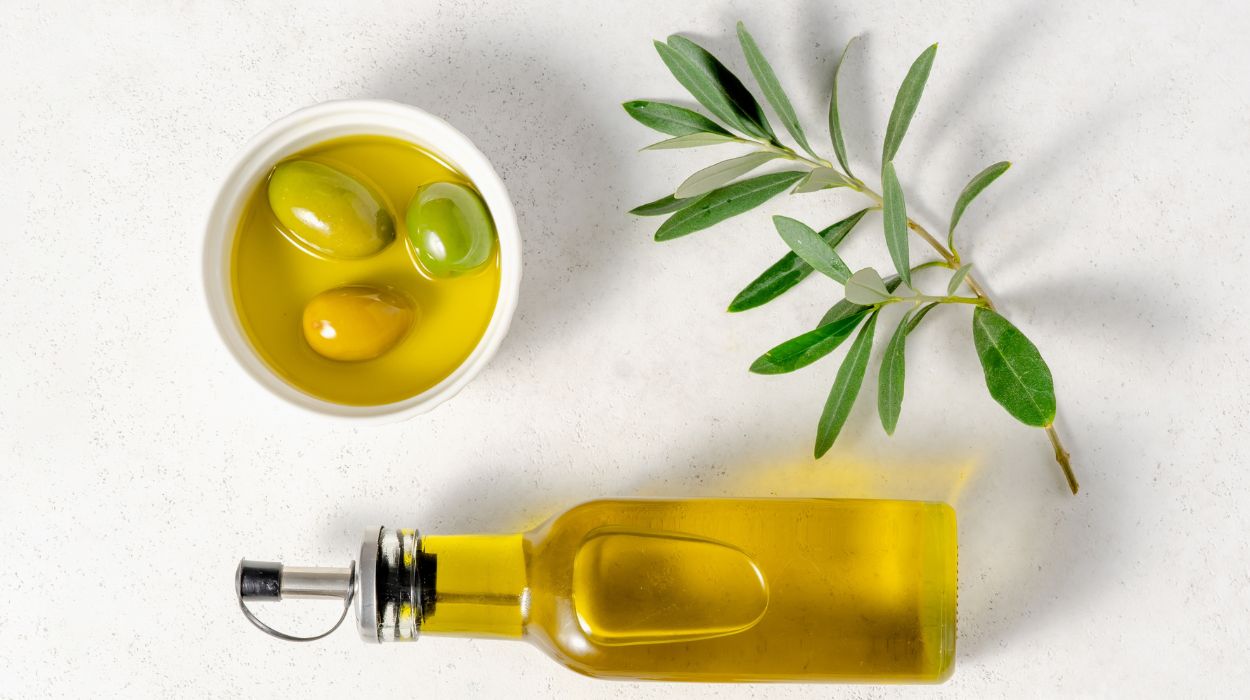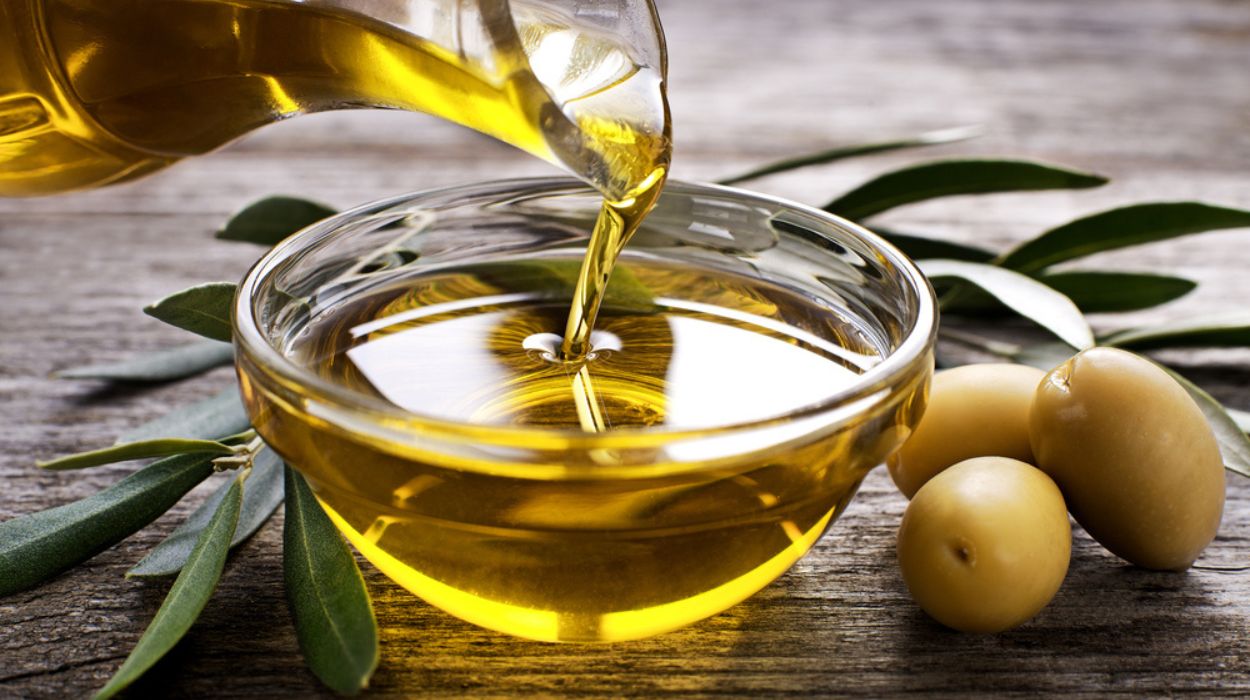Among healthy foods to eat to lose weight, we often hear about filling our plates with ample fruits and vegetables. But what about olive oil?
Olive oil has been a part of the Mediterranean diet for centuries. It’s frequently drizzled on salad and vegetables and is highly regarded for its health benefits, including improved cardiovascular health.
In this article, we investigate olive oil for weight loss. Should you incorporate olive oil into your weight loss diet? Does olive oil make you lose weight? Let’s dive in and find out.
Is Olive Oil Good For Weight Loss?
Olive oil may be good for weight loss. It contains healthy fats that can improve satiety and contribute to other health benefits. However, it’s always important to properly calculate your daily fat needs and avoid going over them. Eating too many fats may lead to increased calorie consumption which can hinder weight loss efforts.
Olive Oil For Weight Loss: Is It Possible?

When it comes to olive oil and weight loss, this food is primarily discussed in relation to the Mediterranean diet. The Mediterranean diet[1] is characterized by high intakes of legumes, vegetables, fish, nuts, grains, seeds, and olive oil. In fact, the primary fat sources in this diet are olive oil and fish.
Those following this diet are thought to have a higher life expectancy and reduced heart disease risks. Olive oil is associated with both of these claims. So, let’s take a closer look at why olive for weight loss may be beneficial.
A Good Source Of Healthy Fats
While a low-fat diet may seem like the obvious go-to for weight loss, fats can actually be part of a healthy diet. Your body needs fats to function optimally, such as properly using fat-soluble vitamins. Olive oil, in particular, is rich in monounsaturated fatty acids.[1]
The main monounsaturated fatty acid in olive oil is oleic acid, which research suggests has beneficial anti-inflammatory effects.[2] Interestingly, studies further link an anti-inflammatory diet, which includes the consumption of olive oil, with improved obesity management and weight loss.[3]
On top of this, monounsaturated fats, when compared to other fats, are linked to reduced food intake[4] due to increased satiety. This can lead to reduced caloric intake, which may promote weight loss.
Generally, the recommended amount of fat per day to lose weight[5] is 20 to 35% of your total caloric intake.[5] For losing weight, this should be calculated from your total caloric needs, which should account for a caloric deficit.
For example, someone eating 2,000 calories daily would need 400-700 calories from fat per day. Since there are nine calories in every gram of fat,[6] this would equate to 44-78 grams of fat daily.
While we look closer at the anti-inflammatory effects of olive oil below, the inclusion of monounsaturated fatty acids may have weight loss benefits.
Rich In Antioxidants
Olive oils, particularly extra virgin olive oil, may further promote weight loss through their high antioxidant content. The main antioxidants in olive oil and olives[7] include phenol alcohols, phenol acids, secoiridoids, lignans, and flavones.
What makes antioxidants so important? Research shows that antioxidants positively impact the metabolic and hormonal systems, which may improve obesity[8] and lead to weight loss. This may occur through antioxidants’ ability to neutralize free radicals, which in high amounts can lead to chronic diseases.[9]
However, it’s important to note that eating high-antioxidant foods alone won’t necessarily promote weight loss. Sustainable and healthy weight loss requires a holistic approach, such as a balanced diet, exercise, stress management, and other lifestyle changes. While weight loss supplements can help, these also shouldn’t be relied on as the only strategy for weight loss.
Anti-Inflammatory
Extra virgin olive oil is shown to have various anti-inflammatory effects. Research demonstrates that these anti-inflammatory effects can reduce the risk of inflammatory diseases[10] like arthritis and inflammatory bowel disease.
When using olive oil for losing weight, this is a huge plus; it can be hard to lose weight with painful and stiff joints. This may lead an individual to forego exercise, which is part of a balanced weight-loss approach.
Reduces The Risk Of Heart Disease

According to a 2017 study, extra virgin olive oil helps improve blood pressure and reduce body fat.[11] Another large study associated olive oil with a reduced risk of cardiovascular events and stroke.[12]
Considering obesity’s well-known contribution to heart disease, using olive oil for weight loss can support overall heart health. It may also prevent negative health events like a heart attack or stroke as you begin to make positive changes in your life.
Decreases The Risk Of Diabetes
More olive oil consumption is linked to a decreased risk of type II diabetes.[13] This can lead to better blood sugar management and improve insulin resistance, which may prevent weight gain. It may improve your weight loss efforts, leading to fewer hurdles and more long-term improvements in health.
May Benefit Brain Function
Surprisingly, there’s a connection between olive oil and the gut-brain axis.[14] Poor gut health is linked to the development of obesity, metabolic disease, and certain neurological conditions.
The fats and phenolic compounds in olive oil may contribute to the prevention of neurological conditions due to its protective action against free radicals. Olive oil may also support the brain through the gut-brain axis by contributing to a healthy gut microbiota.
As a result, your brain and mental health may be much better off. This could contribute to overcoming the mental hurdles involved in a healthy and sustainable weight loss journey.
The Nutritional Value Of Olive Oil
The best olive oil is extra virgin olive oil. This is because it’s the least processed type of olive oil.
One tablespoon of extra virgin olive oil[15] includes:
- 120 calories.
- 14 grams of total fat.
- 2 g of saturated fat.
- 10 g of monounsaturated fat.
- 1.5 g of polyunsaturated fat.
Olive oil contains primarily fat. However, as previously mentioned, these types of fat are considered healthy fats.
What about olive leaf extract for weight loss? Research shows that olive leaf extract may reduce weight[16] when combined with a caloric deficit. In other words, it may have similar effects to olive oil.
It’s also important to consider protein intake as part of a healthy weight-loss diet. With strength training, adequate protein consumption may contribute to increased muscle mass. With muscles using more calories at rest than fat, this can lead to greater caloric expenditure and weight loss.
A great way to up your protein intake is through protein shakes for weight loss. These can usually be included once a day, alongside whole food and lean protein options.
Interested in calculating your protein needs? Simply multiply your weight in kilograms by 1.2 and 1.5. This will provide a range of protein intake[17] (in grams) that is healthy for you. For example, an 80-kilogram adult would need 96-120 grams of protein per day.
Aim for the lower end of the range if you’re less active. Aim for the higher end of the range if you’re more active.
How To Use Olive Oil For Weight Loss?
Olive oil can be a great addition to a clean eating plan for weight loss. It can also be a great option for cooking. With that in mind, here are a few ideas for how to take olive oil for weight loss:
- Make a salad dressing by squeezing half a lemon or adding lemon juice to olive oil.
- Drizzle it over the top of the vegetables.
- Make a glaze for meats or veggies by mixing it with herbs or spices.
- Mix vinegar, olive oil, and salt for another type of salad dressing.
- Drizzle on roasted potatoes.
- Mix into grain or veggie bowls.
- Bake with it by replacing butter with olive oil.
- Use it for stir-fries.
- Grease pans with olive oil.
- Drink it straight by having a tablespoon.
However, maybe you’re still wondering, how long does it take to lose weight? This depends on the amount of weight needed to lose and your individual goals. For some, it can take months or years to achieve their goal weight.
Don’t let this discourage you. Sustainable weight loss takes time, but it is worthwhile for overall health and quality of life.
Conclusion
So, is olive oil good for weight loss? Diets rich in olive oil appear to have various health benefits, including contributing to healthy weight loss.
The key is to avoid going overboard with your servings of it. This can be done by calculating how much fat per day you can consume within your calorie allowance.
While incorporating olive oil can be great for weight loss, don’t forget that sustainable weight loss is achieved through various approaches. Make sure to get adequate movement each day and incorporate many different whole foods to ensure adequate nutrient intake.
Frequently Asked Questions
Yes, olive oil can be part of a healthy weight loss diet. Since it contains monounsaturated fats, it’s considered a healthy fat that can improve satiety.
The truth is you can take olive oil at any time of the day. Many people prefer to take it in the morning on an empty stomach, potentially to push breakfast later. However, do what works best for your lifestyle.
Generally, the consensus is to not consume more than four tablespoons of olive oil per day. Yet, you’ll want to determine the right amount depending on your fat allowance, which is based on your daily calories.
Drinking olive oil on an empty stomach may be good for you and your gut. Yet, this may come down to each individual and their digestion. Try it out and see how you feel.
 Evidence Based
Evidence Based
